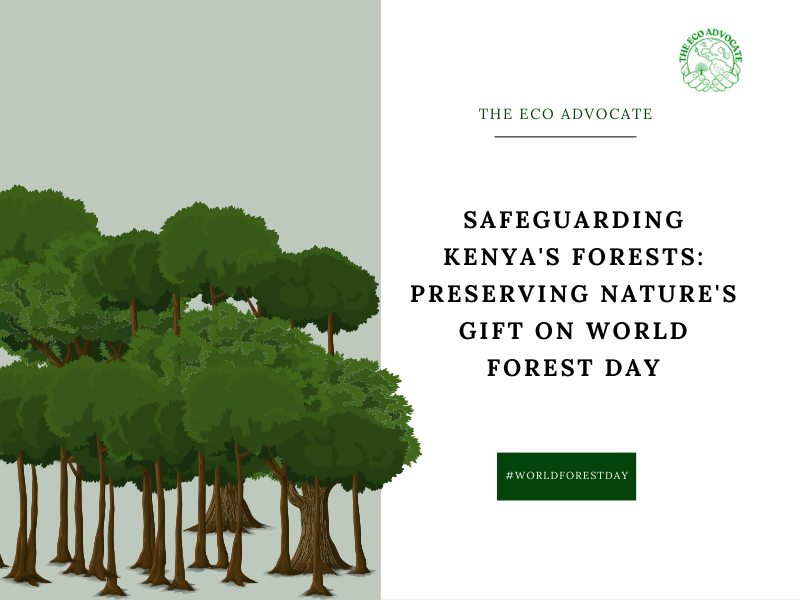World Forest Day is an annual celebration that reminds us of the vital role forests play in our lives and the urgent need to protect and preserve them. In Kenya, a country blessed with remarkable biodiversity and breathtaking landscapes, our forests are invaluable treasures that demand our utmost attention.
Let’s celebrate World Forest Day by recognizing the importance of preserving and nurturing Kenya’s forests. These precious ecosystems contribute significantly to our environment, economy, and overall well-being.
The forests in Kenya have great ecological importance
Kenya’s forests are home to a rich array of plant and animal species, many of which are endemic and found nowhere else on Earth. These ecosystems provide essential habitats for numerous wildlife, including elephants, lions, giraffes, and countless bird species. Forests act as ecological safeguards, preserving natural balance and safeguarding biodiversity.
Moreover, forests play a fundamental role in regulating the local climate. They act as carbon sinks, absorbing significant amounts of carbon dioxide from the atmosphere and helping to mitigate the impacts of climate change. Kenya’s forests contribute significantly to the nation’s carbon sequestration efforts, reducing greenhouse gas emissions and ensuring a more stable and sustainable environment for future generations.
Economic Benefits of Forest Conservation
Beyond their ecological importance, Kenya’s forests offer unparalleled economic benefits to local communities and the nation at large. Forests contribute to the livelihoods of millions of Kenyans, particularly those living in rural areas. Forests provide valuable resources such as timber, fuelwood, and medicinal plants, supporting sustainable industries and creating employment opportunities.
Additionally, forests promote tourism, attracting visitors from around the world who seek to explore Kenya’s exceptional natural beauty. National parks and reserves such as the Aberdare Range, Mount Kenya, and the Maasai Mara serve as prime examples of how forest conservation fosters eco-tourism, driving economic growth and empowering communities through various tourism-related enterprises.
Forest Conservation and Water Resources
Kenya’s forests act as natural watersheds, playing a vital role in ensuring water availability and quality. Forested catchment areas act as sponges, preventing rapid runoff and soil erosion, which helps to recharge groundwater and regulate river flow. This sustainable water management provided by forests is crucial for agriculture, hydroelectric power generation, and the overall well-being of both rural and urban communities.
By safeguarding our forests, we protect our water sources. Watershed degradation can lead to reduced water availability, increased vulnerability to droughts, and the loss of important aquatic ecosystems. Conserving our forests is not only essential for current water resources but also for the future sustainability of our freshwater systems.
Addressing Threats to Kenya’s Forests
Despite their immense significance, Kenya’s forests face numerous threats that endanger their existence. Uncontrolled logging, illegal encroachment, unsustainable agriculture practices, and climate change pose significant challenges to our forest ecosystems. To counter these threats, a multi-pronged approach is necessary.
Firstly, strengthening law enforcement and enhancing sustainable forest management practices are vital. Stricter regulations surrounding logging and land use must be implemented, and efforts to combat illegal activities should be intensified. This requires effective collaboration between government agencies, local communities, and international partners, ensuring a sustainable model of forest resource management.
Furthermore, community-based forest management programs and initiatives should be encouraged, empowering local communities to actively participate in forest conservation. By involving local communities in decision-making processes and providing them with incentives for sustainable forest resource use, we can foster a sense of ownership and stewardship, leading to successful long-term conservation efforts.
Conclusion
On this World Forest Day, let us reflect upon the invaluable contributions Kenya’s forests make to our lives and commit ourselves to their preservation. Protecting our forests safeguards biodiversity, supports the economy, ensures water security, and mitigates climate change. By addressing threats such as deforestation and unsustainable practices, we can build a sustainable future for Kenya, one where forests thrive, communities prosper, and future generations can continue to reap the incalculable benefits of these majestic ecosystems. Together, let us cherish and protect nature’s precious gift, our forests.

